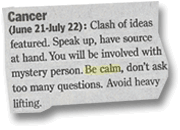08 Feb Marching to a Postmodern Beat
 My ride into work this morning: I take the subway but it’s elevated much of the way in. It’s getting lighter earlier and my commute and the sunrise are almost in sync. I’d say by next Wednesday it should be rising just as we come to the surface.
My ride into work this morning: I take the subway but it’s elevated much of the way in. It’s getting lighter earlier and my commute and the sunrise are almost in sync. I’d say by next Wednesday it should be rising just as we come to the surface.
When waiting for my morning train I usually position myself towards the middle of the platform. That way I’m perfectly situated to transfer to another line at the Metro Center stop. Today, however, the train was pulling into my station just as my daughter and I exited the elevator. So we raced to catch the last car as it pulled up.
When you commute everyday, you often see the same people. We are, afterall, creatures of habit and most, like myself, know the shortest line between points home and office. A man commuting with a small child cannot blend easily into the background. No hiding behind our Washington Post. We are often magnets for either knowing looks or small talk as my daughter and I interact with each other. Today, however, she slept (not a normal occurrence but she had gotten up at 4 am, completely awake and ready for her day). With none of my regular commuters nearby, this gave me time to watch the pink sky and look around.
The man sitting next to me was reading an intriguingly titled tome: The Postmodern Military. Military personnel, on their way to the Pentagon, often ride with us. But this man was dressed in jeans, a t-shirt, a baseball cap, and Nikes. Book and dress: a postmodern combo to be sure.
This only peaked my interest. And I almost turned to him but decided the effort was too much so early in the morning. What would Roland Barthe say about this? Is the military able to distiguish between simulacrae and the real thing? I laughed to myself, just a little too loudly. He looked up.
According to Charles Moskos, the editor of The Postmodern Military,
the Modern military, a product of the 19th century, was closely associated with the notion of the nation-state: “a combination of conscripted lower ranks…a professional officer corps, war-oriented in mission, masculine in makeup and ethos, and sharply differentiated in structure and culture from civilian society.” The Postmodern military, by contrast, is a much more loosely tied to the nation-state, as global financial forces and transformations in telecommunications, to name a few changes, erode the power of the self-enclosed state toward a looser confederation of ideas and ideals. The military in this context is shifting towards a volunteer force, more androgynous in nature and more integrated with civilian life. Without the threat of invasion, the armed forces need no longer be seen as distinctive from the rest of society.
Perhaps this fellow rider’s “uniform” was an example of this new paradigm.
I was amazed to read the other day of the US military’s most recent Predator mission over Afganistan. Usually these unmanned observation planes are used for reconnaissance and spotting targets. However, on Thursday, it was armed with a Hellfire missile which was remotely used to “eliminate” a trio of white-robed men, one of whom appeared to be very tall and whom the media hopefully speculated might be Osama.
Stephen Wilson, in Information Arts: Intersections of Art, Science, and Technology, questions whether physical bodies and space are still relevant in this postmodern age. “Digital communications and telepresence allow people to perceive and act at a distance, disregarding old constraints of physical space…The body and physical space may decrease in importance.”
I started to wonder how our new Postmodern military might be simultaneously distancing and integrating itself into our reality. Suddenly, the sun peeked out in the distance and the man and his book sitting inches from me faded away. I can’t wait for next Wednesday!
[Update: It wasn’t Wednesday, but Tuesday! And it wasn’t Osama but “scavengers” Jahan Gir, Mir Ahmad, and Daraz who were looking for scrap metal!]




Sorry, the comment form is closed at this time.